Well to be honest – they rarely eat their own babies – and if they do – there is usually a good reason for it.
Gerbil mums may kill their own pups; they may chew bits off their live pups; some pups may just die of natural causes and the mother eats them afterwards. Some mothers don’t eat their dead pups at all, they just move them out of the nest.
Don’t let this put you off breeding gerbils, however, as these things rarely happen – and if you understand why this happened – it makes perfect sense to a gerbil.
You can’t possibly blame the mother for her actions.
Gerbils are all individuals and what happens to one litter may not happen to the next.
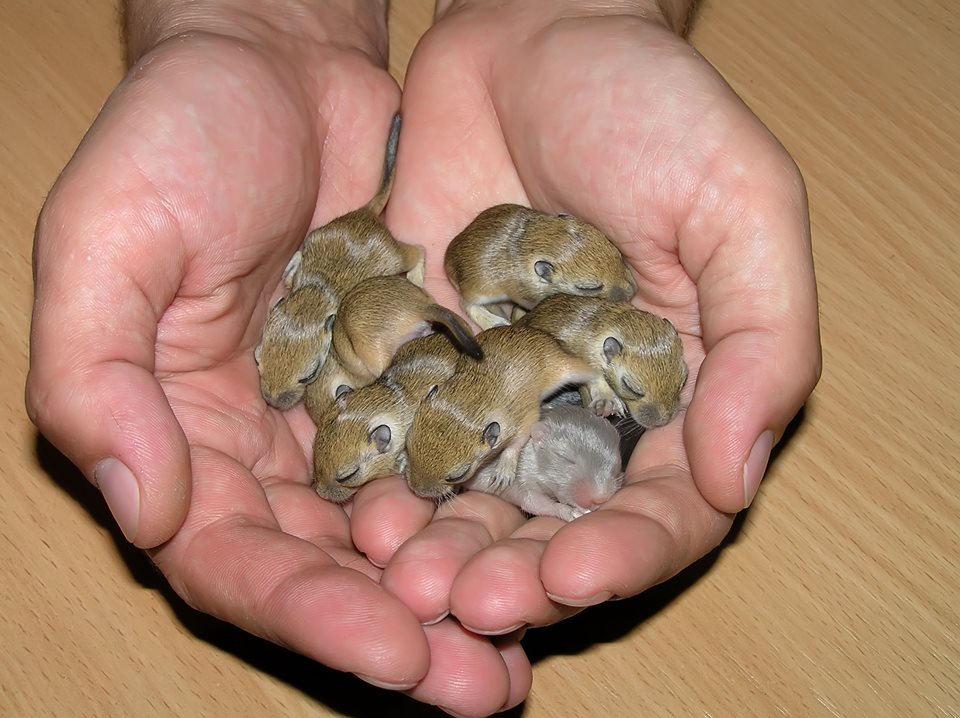
Also, gerbils breeding in captivity as pets behave very differently from those in the wild, and comparisons can’t always be drawn between them when it comes to breeding and parenthood. They are no longer ‘the same’.
Finally, not all gerbils are equal. Not all gerbils are given the same opportunities as other gerbils and so the results are never going to be the same in every instance. Some gerbils just have it much better than others – nature as well as nurture.
So what would be perfect?
Under perfect circumstances, a female gerbil would be a good weight, healthy-looking* and active and be totally relaxed around humans, calm-natured and safe.
She would be paired up with and living happily with one single unrelated healthy adult male gerbil – who will spend time with here and show her affection.
They would be living in a simple, clean tank with plenty of nutritious food, fresh water, and a spattering of fresh fruit and vegetables.
This tank wouldn’t be too hot, too cold, in a kitchen or other busy or noisy spot, and the bedding would be suitable for young gerbil pups.
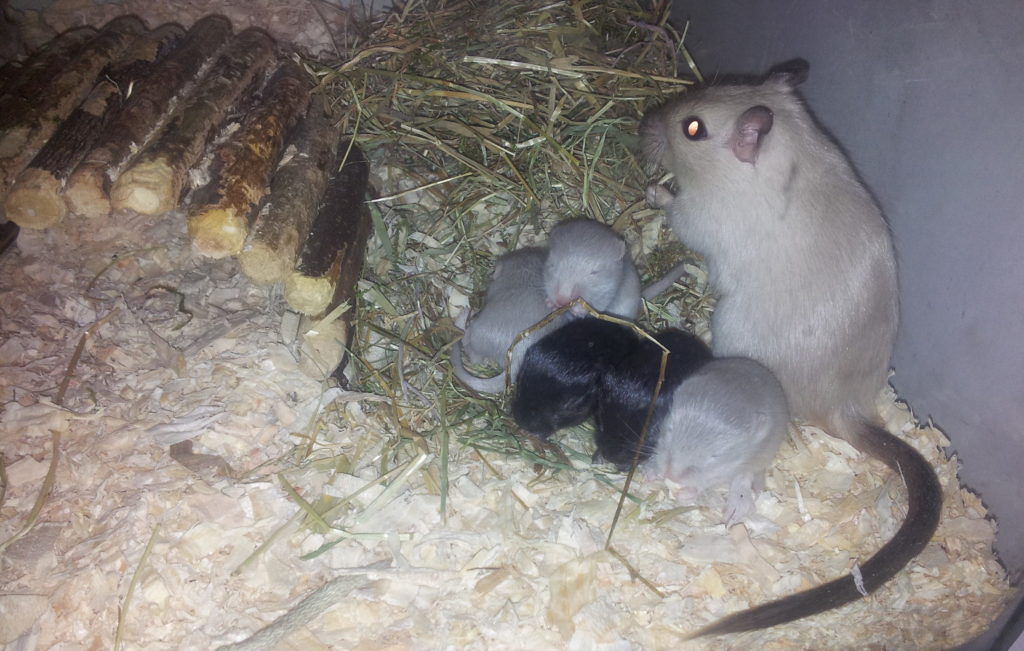
*You can’t tell if a gerbil is healthy on the inside. You can’t see if their organs are working correctly, whether they are prone to issues or whether they have good reproductive health. You just have to make sure there isn’t a chance of any of these things in plain sight, from their past history or from that of their families.
What if it all isn’t perfect?
Well, a whole host of things affect whether a gerbil family are able to produce and raise young – just like with all mammals.
It might have all the attributes explained above – but still you lose the pups and your gerbils may eat their young.
Generally, this undesirable behaviour is something to do with either the mother’s health or the mother’s state of mind, but this covers a whole host of things – so here are a few of the most often talked about.
It can also be caused by environmental factors at the time of birth.
Ill health of the mother during pregnancy – if the mother is unable to host a full litter to term for whatever reason – she may well have pups that have not developed properly. Pups that are not formed properly may well be eaten to regain the nutrients and/or you may find you gerbils eating babies to keep the nest tidy.
Ill health of the mother during lactation – if the mother is unable to lactate effectively to feed all of her pups – either because she isn’t converting the nutrients effectively enough or she is ill in herself – she may well lose the pups through starvation. She may well ‘realise’ that she can’t take care of them all and so oust out the runt (or any of them really) so that she doesn’t have to feed them all anymore.
We don’t know this for sure, but other rodent studies have suggested this could be the case.
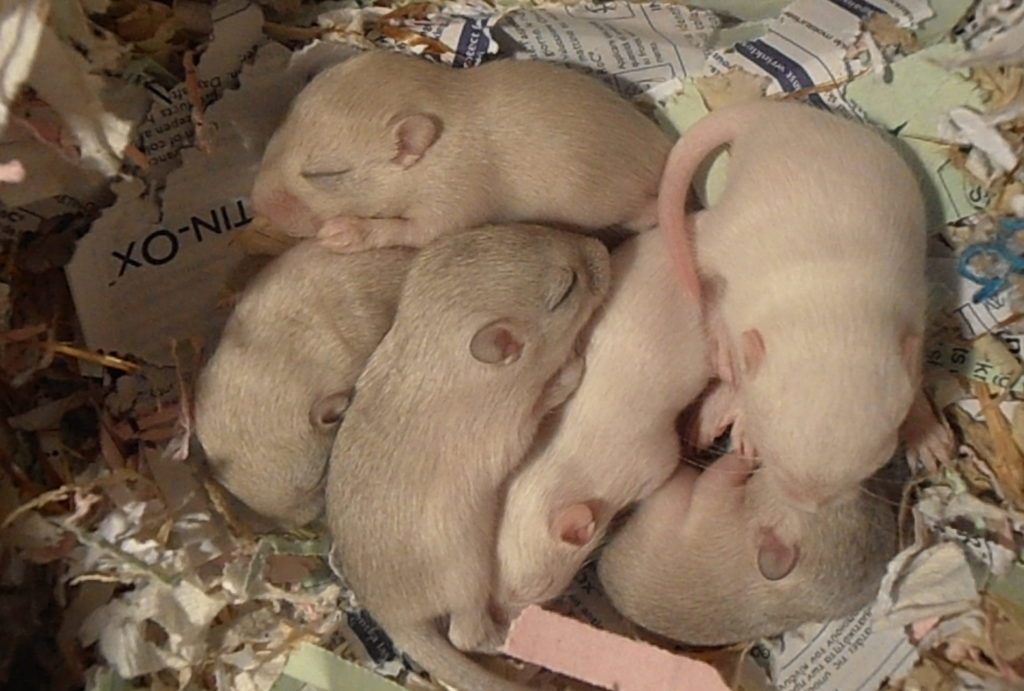
Ill health of the pup at any time – If one or more of the pups gets ill or is born with a serious health issue, it may well not be able to feed properly or convert the food it is getting into body weight for growth. As it weakens, the mothers may eat their young or it may die naturally.
Not enough water or super nutritious food for Mom – both of these are essential during pregnancy and lactation – more than you can imagine. Baby gerbils are made and grown entirely by the mother emptying out her body of its vitamins and minerals and passing them into the pups. Everything needed to grow a pup to the age of 3 weeks old comes entirely from within the mother’s body.
So you need to put it in there otherwise she won’t have enough.
Add a second water bottle if you can incase one stop working or check it all the time. Scatter feed nutritious snacks like sunflower hearts and mealworms all over the tank on top of more than usual amounts of standard gerbil food. Yes, the dad may well get a bit plump on the extras too – but you are doing it for the pups you want to bring into the world.
The more you put into the mum – the more you will get out of it in the pups.
The runt keeps missing out – if the litter is large and the competition is fierce (and/or the mother isn’t the most attentive for whatever reason or she hasn’t got enough food inside her to make the baby’s food) the smallest pup, or pups, could miss out on vital milk.
Normally the runts are able to catch up as they age – but if the mother has had a big litter added to any other issues mentioned here, these runts may miss out – it is just bad luck.
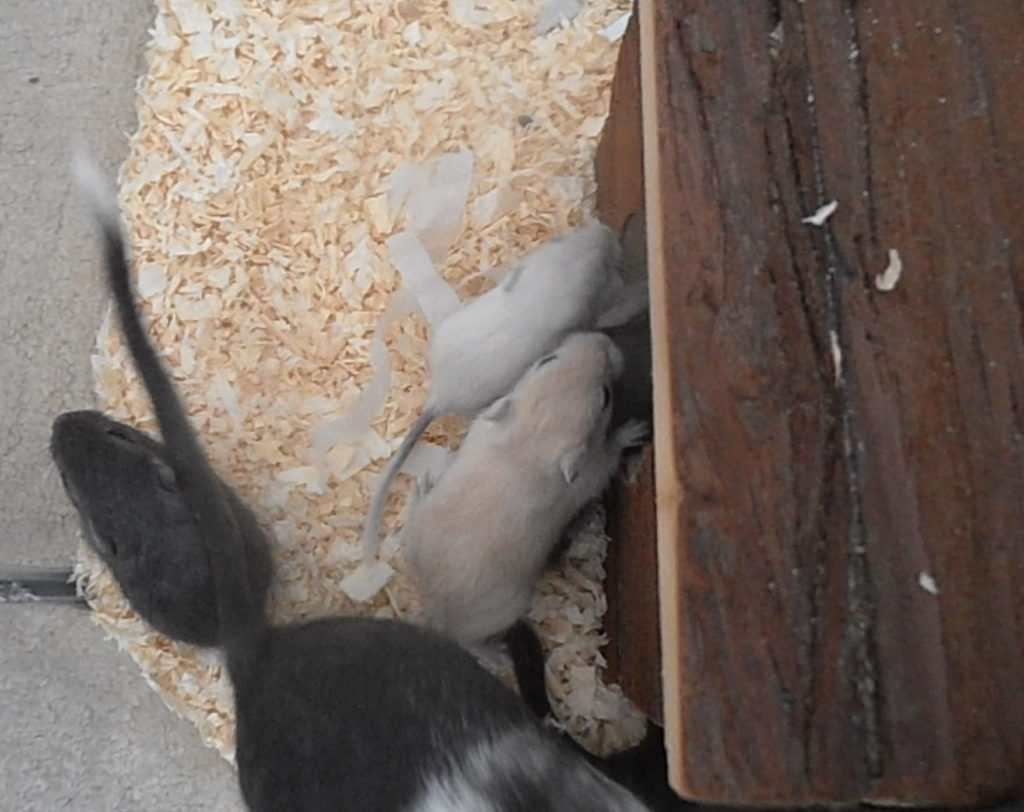
The mother is super stressed – this can be due to a number of factors that you may or may not be able to do anything about. And a gerbil being stressed is based purely on the gerbils thoughts alone – it may be from something that you as a human don’t think is stress-inducing.
For example, being in a spot where there is constant disturbance. Yes, they were always so attentive before whenever anyone came in the room – but now, the constant movement is something they need to be wary of now that they have a young litter. They need to protect their young and so you just going about your normal life may actually be making the mom think ‘can you just sit still!’.
You know when something starts to annoy you for no real reason – but then you can’t stop thinking about it?
Similarly, some gerbils get stressed with constantly having shadows falling over their tank – always the case if you and your family are walking between a sunny window and the tank. This moving shadow can trigger a prey response in the gerbils – so if the weather is sunny at the wrong time – she could think her pups and herself are under constant threat.
Other things can have the same effect on her – like you moving things around her tank – adding things to her tank – checking the babies – playing with the babies, playing with the dad – moving the tank near to a source of noise or near a source of a draught – a whole host of things that didn’t seem to annoy her before – could well just start annoying her now.
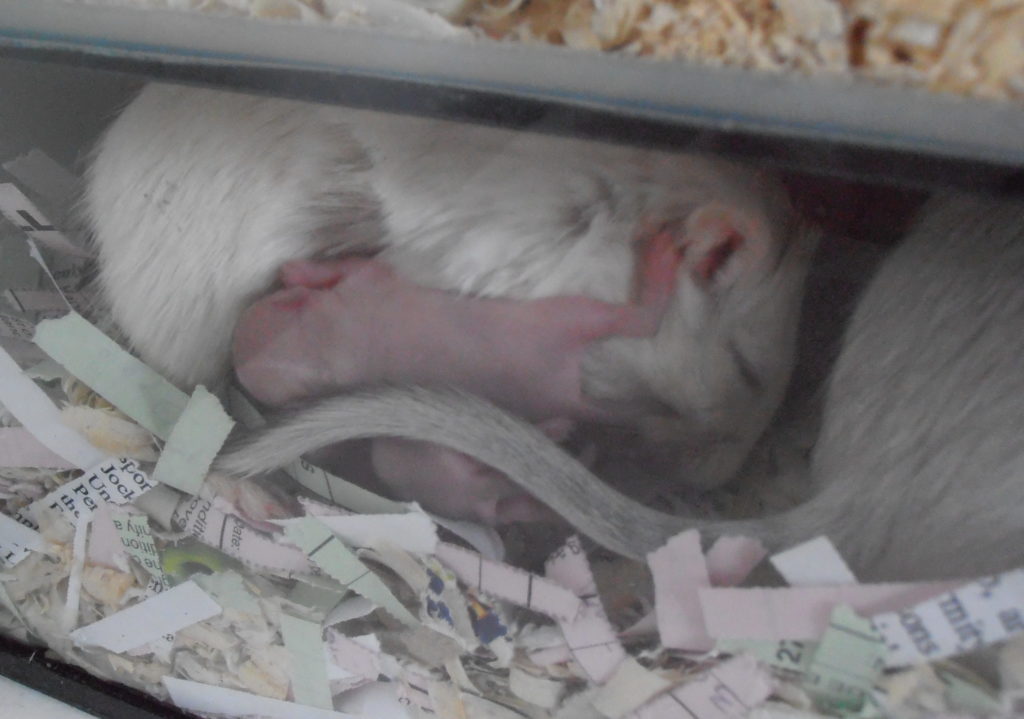
The mother isn’t a good mother. Well, this one is debatable. How do we know that one mum who eats their babies is a bad mother as opposed to a mother who for whatever reason, can’t seem to have healthy pups?
Perhaps, she has sick pups, or thinks she has sick pups – or perhaps she just doesn’t actually want the pups at that point due to other reasons she thinks are real and a possible threat to her pups. Surely she is just protecting them and herself?
If you think she did it on purpose – then perhaps you just accept that and stop breeding from her.
I don’t think being a ‘bad mother’ is passed down through the generations, I think they are just individuals who act in strange (to us) ways.
So, is your gerbil mum evil?
No, she very well is not. She is just an animal taking steps that she thinks are the best for herself and her family.
Whether she herself, or her pups are ill, or she thinks they are all in danger of being killed by predators – she is making the best decision she can as to whether to keep feeding her pups with her own body parts or to stop it all now and make herself free to deal with whatever comes her way.
Gerbils have different principals and ethics to us, and no matter how much you want to interfere with her natural choices – you just can’t.
It is almost impossible to hand rear gerbil babies under 2 weeks – and the only time I tried it was to help a single pup whose siblings had already died survive from the age of 2 weeks. She did survive (pictured below) – but she was blind because her eyes hadn’t formed properly and we think she had sustained some damage to her brain too with an infection.
No wonder the other two had died and were eaten – they were all very ill.
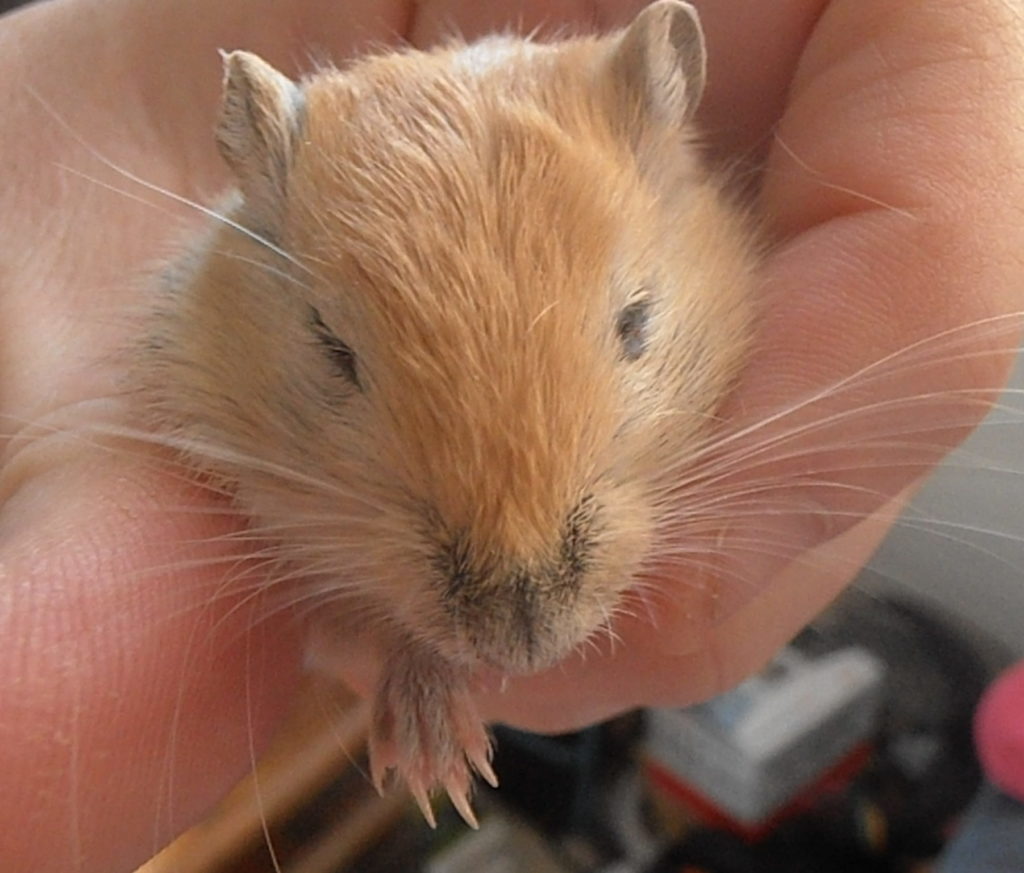
On a final note: If you have more than two females in a tank together when pups are born, you are drastically increasing their chances of being eaten.
Even though this – again – is totally natural to gerbils – it is totally avoidable by us humans – unlike most of the above.
Due to the nature of wild gerbil clans – there is always a dominant female in a clan and technically she is the only one allowed to have pups. However, in a domestic situation – this is often distorted either allowing the non-dominant female to become pregnant alone or allowing more than two females to get pregnant at the same time.
Clearly, the dominant female is going to have something to say about that – and she often takes it out on the pups.
She will very likely ‘remove’ some or all of the other females pups from the clan, whether they are ill or not – especially if she hasn’t got any pups of her own yet and it is quite common to see a gerbil eating babies that aren’t theirs.
If she gave birth first she may be a bit more lenient, but you just never can tell with females…
Be considerate to your females if you want them to breed successfully and give them every opportunity to be content and relaxed – and the results will be wonderful.